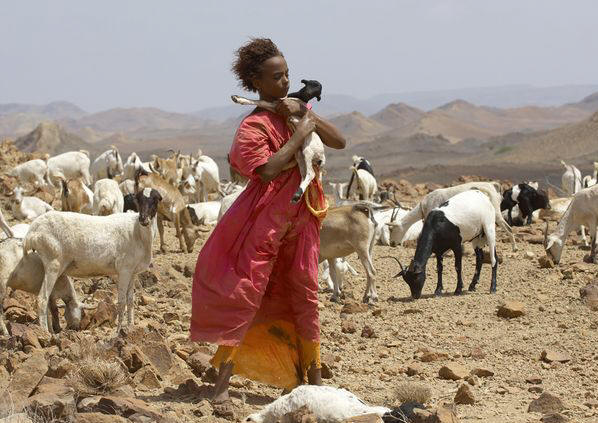
Sunday, March 27, 2011
PHOTOS |
COMING SOON|
EXAMINER.COM FILM ARTICLES
||HOME
MOVIE REVIEW
Desert Flower
The True Pain, Pride And
Beauty Of An African Woman

Liya Kebede (left) plays Waris Dirie, whom she embraces here on the set of "Desert
Flower", written and directed by Sherry Hormann. National
Geographic
by
Omar P.L. Moore/PopcornReel.com
 FOLLOW
FOLLOW
Sunday,
March 27, 2011
Shattering, absolutely necessary viewing, "Desert Flower" tells the tortuous and
triumphant true story of one-time supermodel Waris Dirie, who at the age of six
had her clitoris forcibly removed in an act of female circumcision in her native
Somalia. A nomad, Waris at age 13 escaped an arranged marriage to a
grandfather-aged man, criss-crossed the country and escaped to London, where
several years later as a fast-food janitor she was solicited for a photo shoot
by one Tommy Donaldson. The rest was history.
History however, is never far away from Waris Dirie, who in the late 1990s
shocked the fashion world with the disclosure of her genital mutilation.
Ms. Dirie quit a life that brought fame and wealth, became a United Nations
ambassador and continues as an activist to fight to end a violent ritual that
has plagued the African continent among other places. Filmmaker Sherry
Hormann recognizes that Ms. Dirie's prominence came not on a bed of roses or a
conventional rags-to-riches story but mostly out of an urgent commitment to
justice and unobstructed, undiluted womanhood, even if part of that womanhood
was taken from her very early on.
Liya Kebede gives one of the year's standout performances as Waris Dirie, in a
film based on the best-selling autobiographical story by Ms. Dirie and Cathleen
Miller. Ms. Hormann writes and directs "Desert Flower", which is what the
name "Waris" means. The drama has its jagged edges and takes a good 40
minutes to settle.
If every rose has its thorn, then "Desert Flower" is a study in high rose and
low thorn contrasts of Ms. Dirie's life. Many biopics tend to focus on the
lows and end with highs, but "Desert Flower" never lets you forget Ms. Dirie's
journey or her origins. The film has its bouts of warmth and joy but these
are fleeting, indicative of the realistic journey that everyday lives take.
"Desert Flower", its subject and the long trek for justice are all works in
progress. The past is always within each and every one of us, and the
director knows and shows that well in Ms. Dirie's story.
Indeed, Ms. Hormann's arresting film isn't a feel-good journey. While it
has light-hearted moments those arise mainly from supporting performances by
Sally Hawkins as Waris's exuberant friend and Juliet Stevenson as Lucinda, helps
Waris launch her supermodel career. Ms. Stevenson's high-octane,
scenery-chomping turn is a funny, showy bout of extravagance and caricature that
leavens the heavier parts of "Desert Flower". Others however, may be put
off by Ms. Stevenson's portrayal, and although it's terrific (and perhaps based
on a real person or a composite), it doesn't belong in a film of this magnitude.
(If anything though, Lucinda reinforces the film's somber tone.)
To be fair, it is difficult to attain a balance in making a film like this one
about female genital mutilation and make it dare I say, "entertaining" for
audiences. Any signal to levity risks the film's motives and authenticity,
making it instantly questionable and insulting or patronizing. Conversely,
any prolonged focus on this still-troubling and highly important, painful issue
could drive many audiences away, especially those who love horror but couldn't
ever dream of seeing big-screen violence in a real-life context (as in
"127 Hours".)

Soraya Mohamed Ali Sayego plays the
younger Waris Dirie in "Desert Flower". National
Geographic
In all cases, artistic license will inevitably be taken but here Ms. Hormann
does so without sacrificing the essence of Ms. Dirie's story and her stature as
a world spokeswoman and advocate. (Ms. Dirie's Desert Flower Foundation
tirelessly goes to bat to end the atrocity of female circumcision, and the facts
at film's end show that the fight is definitely not in vain.)
Made in 2009, "Desert Flower" isn't easy to watch but neither is Ms. Dirie's
real-life experience. Ms. Hormann's film however, remains discreet
throughout, avoiding any glimpses of graphic violence. The power of this
"Flower" is in its psychological atmosphere as projected through its main
character. The film is about the objectification of Waris as a woman and
the desire to truncate her (with circumcision), to possess her (with marriage
proposals or claims of discovering her), or capture her (with a camera).
The men of "Desert Flower" have their agendas, mostly nefarious, but the one man
earnest enough to care about Waris the most is Harold (Anthony Mackie), though
he's essentially a cameo character on the large but intimate canvas Ms. Hormann
cultivates.
Filmed in multiple countries, "Desert Flower" thrives and is best when it sticks
to Ms. Dirie's story and isn't fixated on how characters around Waris react to
her plight. During the most distressing verbal accounts superfluous shots
of others are meant to evoke empathy with Waris. Ms. Hormann has such a
compelling subject in Waris on the screen that Waris, not others, should speak
for herself. Any audience with a shred of humanity would surely be moved
by Ms. Dirie's experience, so why not clear the cinematic space of supporting
characters, even if they may have been based on real people? In too many
films we get a refraction of real-life characters seen through others' eyes or
about others' struggles ("Cry Freedom", "Amazing Grace" and the upcoming "The
Conspirator", among many.)
In the second hour of "Desert Flower" Ms. Hormann clears out the excess
characters, focusing more centrally on Ms. Dirie. The results are powerful
and beautiful. There are plenty of dream-like, vivid episodes, as if parts
of Waris's body, heart and soul are blossoming. And they are. The
film's vibrant, soul-deep photography by Ken Kelsch is rich and alluring.
Martin Todsharow's music score is poetic, elegant and mournful. The film's
mood is light, reflective, hopeful, sad and jarring, running the gamut of
emotions and feelings.
Waris Dirie has tremendous courage, beauty and determination, and Ms. Kebede is
excellent at plowing the range of Ms. Dirie's personality, giving the character
she plays a hypnotic innocence, authenticity and transformation. It's a
special piece of work, a performance that carries this occasionally wandering
film. Ms. Kebede plays Waris as a tentative, adaptive being, at first
timid then unwavering, then uncertain, then sorrowful, then joyful. Wisely
crafted, disciplined and intelligently rendered, Ms. Kebede gives every part of
Waris Dirie's life dimension and a fair hearing.
Like Ms. Dirie, Ms. Kedebe is a supermodel from the African continent,
specifically Ethiopia. She's also a humanitarian, groundbreaking in her
own right, becoming the first black woman to represent Estée Lauder cosmetics
only eight years ago.
Also of note is the great work of Soraya Mohamed Ali Scego as the pre-teen Waris.
Miss Scego is as authentic and charismatic as anyone you'll see on screen, so
natural and poised playing a younger version of a true-life character, which isn't
an easy feat. "Desert Flower" obviously has an unavoidable political bent
though its activism swells after much of Waris Dirie's personal story has been
told. Ms. Hormann mixes fairy tale fantasy and delicate but powerful
psychological horror to produce a potent and immediate film. The events
depicted resonate. "Desert Flower" is a film everyone should see.
I was left stunned, moved and silenced by the courage, power, pain and
inspiration of Waris Dirie, whom I had previously known nothing of. My
ignorance was carried into "Desert Flower". Typically I go into films
blindly, knowing very little or nothing of their plots. No trailers.
No synopsis. No production notes. Just title, actors and genre.
Into this film I went. Shaken, stirred and transformed I departed.
With: Craig Parkinson, Timothy Spall, Meera Syal.
"Desert Flower" is rated R by the Motion Picture Association Of America
for some violence, a scene of sexuality and language.
The film is in English, Somali and French, and occasional English subtitles. The film's running time is
two hours and 11 minutes, including overture music after the end credits.
The film is now playing in San Francisco, Santa Monica, Washington D.C.,
Philadelphia and New York. "Desert Flower" opens in Berkeley, CA, San
Rafael, CA, Atlanta, Detroit, Chicago and numerous other U.S. cities this
Friday.
COPYRIGHT 2011. POPCORNREEL.COM. ALL RIGHTS RESERVED.  FOLLOW
FOLLOW
SUBSCRIBE TO THE POPCORN REEL MOVIE
REVIEWS RSS FEED
